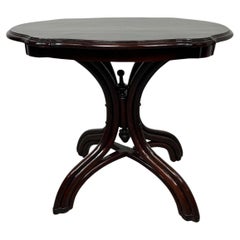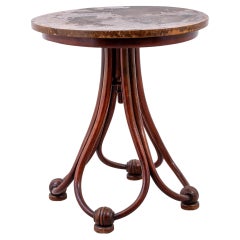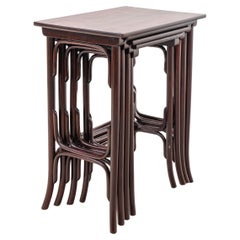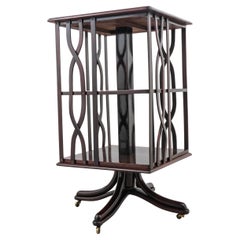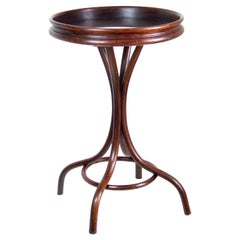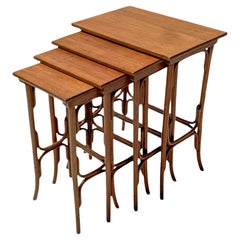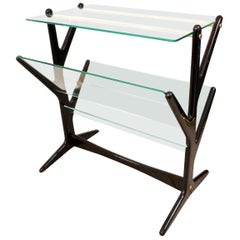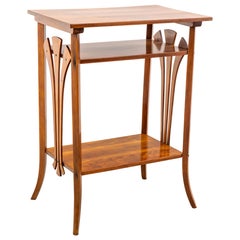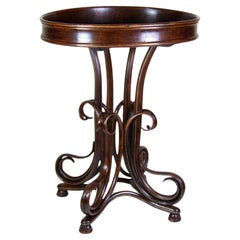Michael Thonet Tables
The development of bentwood for use in furniture is one of history’s most significant innovations in design. A range of renowned mid-century modern designers such as Alvar Aalto, Arne Jacobsen, and Charles and Ray Eames drew heavily on this technological advancement, and the success of their enduring works owes to the efforts of pioneering German-Austrian industrialist and designer Michael Thonet — founder of Thonet and widely considered the father of bentwood furniture.
Bentwood furniture dates as far back as the Middle Ages, but it is the 19th-century cabinetmaker and master of parquetry Michael Thonet who is most often associated with this now-classic technique. Thonet in 1856 patented a method for bending solid wood through the use of steam, and from there, the bentwood look skyrocketed to furniture fame. He experimented with bending birch rods into rounded shapes — forming delicately seductive, curving Art Nouveau creations that were a daring departure from the heavy, hand-carved designs attributed to his contemporaries.
The Boppard-born Thonet honed his carpentry skills in his father’s workshop, where he carried out experiments with plywood and modified the Biedermeier chairs that populated the studio. He received an invitation from Austrian Chancellor Prince Metternich to contribute Neo-Rococo interiors to the Liechtenstein City Palace in Vienna. From there, the cabinetmaker gained international recognition, including at London’s Great Exhibition of 1851, which featured works created by members of the Arts and Crafts movement as well as industrial products. Thonet showed a range of furniture at the fair and won the bronze medal for his bentwood chairs. He incorporated his family’s company, the Thonet Brothers — or Gebrüder Thonet — with his sons in 1853.
Considered the world’s oldest mass-produced chair, Michael Thonet’s ubiquitous Chair No. 14 demonstrated that his patented bentwood technology made it possible to efficiently produce furniture on an industrial scale.
Often called the Coffee House chair — the company’s first substantial order was for a Viennese coffeehouse — the No. 14 remains an icon. Thonet originally designed the chair in 1859, and it is considered the starting point for modern furniture. Composed of just six parts, the chair, with its simple, lightweight design, belies its durability. The No. 14 was followed by the No. 18, or the Bistro chair, in 1867, and the 209, or the Architect’s chair, of which Le Corbusier was a fan. (The influential Swiss-French architect and designer used Thonet furniture in his Pavillon de l’Esprit Nouveau at the 1925 International Exposition of Decorative Arts in Paris.)
The business began mass-producing furniture. By the end of the 1850s, there were additional Thonet workshops in Eastern Europe and hundreds of employees. Michael Thonet’s reputation attracted the attention of notable architects including Otto Wagner, Marcel Breuer and Ludwig Mies van der Rohe.
Thonet’s patented bentwood technology also yielded an improvement to rocking chairs for his company — in the middle of the 19th century, Michael produced a series of rockers in which the different curved parts were integrated into fluid, sinuous wholes. Thanks to Thonet, the humble rocker acquired something unexpected: style. And bentwood furniture was embraced by a series of design greats — the innovation can be found in the seating that Josef Hoffman designed for Thonet, in the elegant Superleggera chair created by Gio Ponti and Alvar Aalto’s expressive Paimio armchair.
The No. 14 chair earned a gold medal at the 1867 Paris World’s Fair and reportedly sold 50 million copies prior to World War I. Today it’s a staple furnishing in countless movies, television shows, restaurants, bars and homes.
On 1stDibs, find an array of antique Michael Thonet seating, tables and more.
19th Century Austrian Vienna Secession Antique Michael Thonet Tables
Beech, Bentwood
Early 1900s Austrian Art Nouveau Antique Michael Thonet Tables
Beech
Early 1900s Austrian Art Nouveau Antique Michael Thonet Tables
Beech
Early 1900s Austrian Art Nouveau Antique Michael Thonet Tables
Beech
Late 19th Century Austrian Art Nouveau Antique Michael Thonet Tables
Beech, Bentwood
Early 1900s Austrian Vienna Secession Antique Michael Thonet Tables
Beech, Bentwood
Early 1900s Austrian Vienna Secession Antique Michael Thonet Tables
Bentwood
1960s Italian Mid-Century Modern Vintage Michael Thonet Tables
Glass, Wood
1920s Austrian Vienna Secession Vintage Michael Thonet Tables
Brass
1950s Austrian Bohemian Vintage Michael Thonet Tables
Cane, Bentwood
Early 20th Century Austrian Art Nouveau Michael Thonet Tables
Beech, Bentwood
Early 20th Century French Art Deco Michael Thonet Tables
Bentwood
1890s Austrian Mid-Century Modern Antique Michael Thonet Tables
Wood
1920s Austrian Vienna Secession Vintage Michael Thonet Tables
Mirror, Wood
1910s Slovak Vienna Secession Vintage Michael Thonet Tables
Beech
1910s Austrian Jugendstil Vintage Michael Thonet Tables
Beech, Bentwood
1910s Austrian Vienna Secession Vintage Michael Thonet Tables
Brass
20th Century Michael Thonet Tables
Wrought Iron
Early 1900s Austrian Art Nouveau Antique Michael Thonet Tables
Beech
Late 19th Century Austrian Art Nouveau Antique Michael Thonet Tables
Beech, Bentwood
Late 19th Century Czech Art Nouveau Antique Michael Thonet Tables
Beech, Bentwood
Early 20th Century Austrian Belle Époque Michael Thonet Tables
Beech, Bentwood
Late 19th Century Austrian Belle Époque Antique Michael Thonet Tables
Beech, Bentwood
Early 20th Century Czech Arts and Crafts Michael Thonet Tables
Beech, Bentwood
Early 20th Century Austrian Belle Époque Michael Thonet Tables
Beech, Bentwood
Late 19th Century Austrian Belle Époque Antique Michael Thonet Tables
Bentwood
1970s German Mid-Century Modern Vintage Michael Thonet Tables
Beech
1880s Austrian Art Nouveau Antique Michael Thonet Tables
Wood
1970s Austrian Modern Vintage Michael Thonet Tables
Cane, Bentwood
Late 19th Century Austrian Vienna Secession Antique Michael Thonet Tables
Mahogany, Pine
